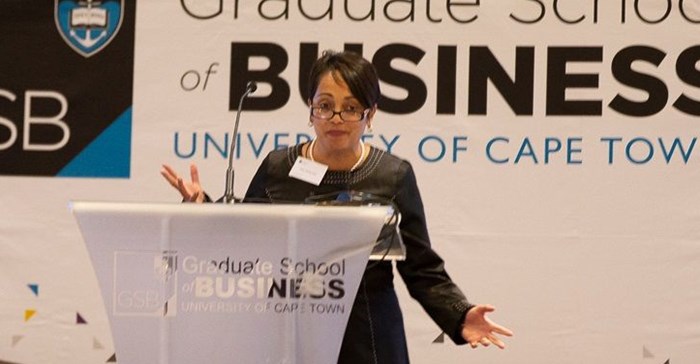Shirley Zinn's is a Cinderella story. A tale of a tenacious woman, who rose above the poverty of the Cape Flats to ivy-league lecture halls and the boardrooms of some of South Africa's biggest enterprises. It is also an account of how immense personal tragedy, and picking yourself up and carrying on, shapes you.

Professor Shirley Zinn
“My parents understood that education would be our liberation,” she says. They also instilled in her the values of respect, humility, hard work ethic, service to others and excellence.
However, it was a conversation with two teachers in her matric year, who believed in her potential, that put her on the path to her first degree. Zinn went on to Harvard for a doctorate in education, but it wasn’t easy journey. Even having very little money didn't stop her from pursuing dreams.
Armed with her impressive qualifications, Zinn applied for a job at the Department of Education, only to be told that she did not have the right profile for the job. There were many the ups and downs, and Kevin, her husband, selflessly supported her as they ventured into the unknown.
Her journey took her to Pretoria, and later, to Johannesburg. “What was meant to be a three-year stay became a 17-year stay,” Zinn says.
During her career, Zinn has held human resources director positions in companies such as Reckitt Benkiser, SARS, Nedbank, Standard Bank and Woolworths Holdings. She has her own business called Shirley Zinn Consulting, and is an extraordinary professor of human resources management at University of Pretoria and an adjunct professor at University of Cape Town.
But in 2005, her life was devastated when her only child, Jamie, was killed in a car crash returning from a family holiday. So, in 2015, and prompted by her husband, she published her autobiography, Swimming Upstream focusing on her personal and professional journey. She aims to motivate and inspire youth and women to see what they can achieve despite adversity.
Here are some of her life’s lessons:
- Humble is not a weakness. It takes courage to be humble.
- Do acts of kindness. It sounds soft and waffley in a boardroom, but it is important.
- When you show gratitude, there is a shift in your mindset.
- Deliberately surround yourself with people who will uplift you.
- Don’t be angry or disappointed for too long.
- Live your life with meaning and purpose.
- From a human resources perspective, create a humanistic environment. It’s very important for sustainability to create an organisation that cares about people.
- Every building block on your journey is another level of complexity that you are being prepared for. We think things get easier, but we need to bed down our wisdom as we go.
- Adversity and trauma do come. It is important to stay optimistic in turbulent times.























































